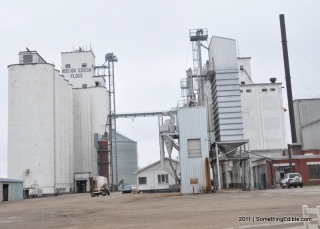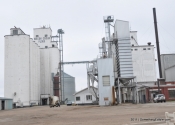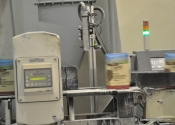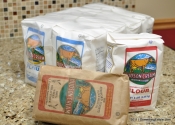Some food, some drink.
Let’s hear it for gluten! My trip to the Stafford County Flour Mills.
Abstract: Kansas is the Wheat State. We are the number one exporter of wheat in the nation. Such as it is, Kansans aren't known to brag, so I think people sometimes take for granted the origin of the magic combination of starch, protein, and gluten that makes up a majority of our baked goods. My daughter and I recently made a trip to visit the good folks at the Stafford County Flour Mills to see how they make a baker's primary pantry staple. Pack up the mini-van, 'cuz we're headed out to see where Hudson Cream Flour comes from!
Purpose: I miss those field trips in elementary
school. You know what I'm talking about; those trips where the class
got to tour a factory, warehouse, or distribution center so you could
see where it all comes from. Now that I oversee only one kid
during
normal business hours and taking a preschool girl into a men's room is
only mildly embarrassing, field trips are again becoming more feasible.
While looking for keen places to visit that I could share with y'all,
it occurred to me that the wheat I use for almost every bread, cake, or
cookie that comes out of my kitchen is grown and milled less than a
couple
of hours from my house; and I don't know as much about that as I
should.
After my post regarding Al's
Cinnamon Raisin Bread, Stafford County
Flour Mills gave me a standing invitation to come tour the facilities,
so I decided to take 'em up on their generous offer.
Going into the tour, I wasn't sure exactly what I'd be seeing. I
had a pretty good idea of he process by which flour is made (if you
don't, you can check out this neat-o
flow chart,
courtesy of the Kansas Association of Wheat Growers) and this geek
could probably put you to sleep babbling on about all the technical
details. However, I think that the
real story about this mill is everything peripheral to the
actual flour-milling process itself. The go-to guy at the
Mill in Hudson, Kansas re: food safety and production is Randy Watson.
He showed
me and my little girl around the
operation, and it truly gave me a new perspective on the flour I use (I
can't speak for my four-year-old).
Here
are the highlights of the things I learned that day:
Observation:
- First, let me entertain those obsessed with numbers -
- Those "prairie skyscrapers" you see in the pictures are grain
[storage] elevators. Stafford Mills has a capacity of around 1.4
million bushel. Assuming my math is good, that's enough space to hold
42,000 [US] tons of wheat if they were filled to the brim (and keep in
mind, this is a smaller mill)!
- The mill there in Hudson has a capacity of approximately 8300
lbs per hour; that's 1660 5lb bags. In
about 5 hours of production, they'll mill and pack enough flour to fill
a semi, and for five months out of the year, they run 24/7.
- To understand all-purpose (ap) flour, it helps to understand the other ap; anatomy and physiology (of plants, that is). Most of what's in all-purpose flour is the endosperm of the wheat berry. It's not an accident that what we're eating is a great source of energy. Essentially this is the same food source that a sprouted seed will use to grow until it gets big enough to shoot out leaves and get green so it can start making its own food.
- In the effort to get at that energy-rich endosperm, for every 100 lbs of wheat that is ground, reduced and sifted numerous times, 72 pounds will become all-purpose flour.
- Whereas most ap flour is "straight grade", Hudson Cream is a "short patent" flour. To be called Hudson Cream, the flour has to be sifted even more selectively which allows for better rise and a more even finished texture. Only 62 pounds out of that original 100 will become Hudson Cream (hence the name).
- Approximately 90% of the flour milled at the Stafford County Mill is local; and what you gotta understand is that "local" means something entirely different to Kansans than it does to city slicker. The vast majority of what the Stafford Mill procures is grown not more than 15-20 miles from the mill. When they gotta fill in with additional grain, they might have to bring in wheat down the road from out as far as Scott County (in a rural context, this is a whole world away).
- Most of the wheat milled in Hudson is the hard red winter wheat that is in no small part responsible for the settling of this area. However, the mill also coordinates with producers to locally grow hard white winter wheat for their whole wheat flour, as it makes for tastier baked goods where using the entire grain is concerned.
- Our aforementioned tour guide and milling guru Randy Watson not only heads up the efforts where food safety is concerned, he's also certified organic (and no, he doesn't roam the mill in Birkenstocks smelling of patchouli). Come to find out, you can't give a business an organic certification; it has to rest on the shoulders of a person. His oversight ensures that the Stafford Mill can produce organic flour. Serendipitously, because the grain is stored at the same location at which it's milled and bagged, cross-contamination (the bane of organic certification) is easier to mitigate. So in essence, organic certification jibes with the way these folks do business anyway. The day I was there, they happened to be milling the Kroger-branded Private Selection organic flour, and the Stafford Mill is the sole supplier of that product.
- Likewise, being able to track their grain from field to bag also means that with a Kosher certification they are also also able to produce other carefully scrutinized products such as Kemach's Yoshon flour.
- Speaking of being persnickety, the mill also carries a "B" rating
with the Global Food Safety Initiative (GFSI).
In a nutshell, you have a small mill that goes the extra mile to
conform to the food safety standards established by the big players in
the industry. Because accountability is key with this
certification, it's a winning situation across the board from the
producer
to the consumer.
- Stafford Mills processes and bags for a wide variety of customers and brands. In addition to their producing things as far-out as "chicken wing pre-dust" for meat processing operations, I also happened to spy bags of King Arthur flour in their warehouse, which they happen to bag for a mill up the road.
- Much of the prosperity of this mill has ties to the Appalachian
region of the United States. A Kansan transplanted in West Virginia
made a simple request for Hudson Cream flour almost 90 years ago that
turned out to be one of the best things to happen to the mill. We
don't use a lot of self-rising (aka biscuit) flour
around here, but in parts of Virginia, West Virginia, Kentucky, and
Ohio,
I understand Hudson Cream is synonymous with biscuits. If you
have a moment it's an
interesting read
(look around 1922 on the timeline).
Results: If a road-trip is realistic, then I'd
encourage you to go see where
your food or the stuff that goes into your food is made. I don't think
I'm ever going to take something as fundamental as flour for granted
again. Finding out where your food comes from can be
a decisive (or divisive) experience. Understanding what your food
is (or isn't) can spark a dietary sea-change; and for me, this
pilgrimage is a bit of an affirmation of sorts.
I'm choosing to buy a locally-grown and produced product from a local
independent company that supports their
employees and
the community they live in.
As a bit of a side-note, the nerd in me also appreciates that they're
supporting science and
research. Randy told me to date that three people have completed PhDs
with research conducted at their mill. Much of the research
that goes on in a mill pertains to pest management and entomology; so given
my background, I could really bore
y'all to death with some of the neat stuff that I learned (we might
save that for
another day). ![]()
Notes: I can't thank the good people at the Stafford County Mills enough for letting me have a peek behind the curtain of their great operation. If your grocer doesn't carry Hudson Cream Flour (and a visit to the mill isn't feasible), you can always order direct from the folks that make it.
Gallery:
The Stafford Mills operation in Hudson, KS. Storage on the left, mill on the right, offices behind me.
The Stafford Mills operation in Hudson, KS. Storage on the left, mill on the right, offices behind me.
Food safety is taken seriously at the Stafford Mill. In order to take our tour, we first had to make a fashion statement.
Food safety is taken seriously at the Stafford Mill. In order to take our tour, we first had to make a fashion statement.
For our safety (and food safety), we were only allowed to see the belly of the milling beast. The process actually extends three levels up from here.
For our safety (and food safety), we were only allowed to see the belly of the milling beast. The process actually extends three levels up from here.
They didn't really have forklifts in mind when the current mill was established in 1914. The steel plates let modern equipment traverse this historic structure.
They didn't really have forklifts in mind when the current mill was established in 1914. The steel plates let modern equipment traverse this historic structure.
This is where the flour is bagged and bundled for shipping. This line is running 24 hours a day five months out of the year, and is twice as busy now as…
This is where the flour is bagged and bundled for shipping. This line is running 24 hours a day five months out of the year, and is twice as busy now as it was over two decades ago.
The rate at which the twenty-five pound bags were coming off that packaging line was a bit staggering to watch; especially if you consider how long it…
The rate at which the twenty-five pound bags were coming off that packaging line was a bit staggering to watch; especially if you consider how long it takes me to bake my way thru a five pound bag.
Here we have five pound bags passing the metal detector on their way to be shrink-wrapped into forty-pound bales.
Here we have five pound bags passing the metal detector on their way to be shrink-wrapped into forty-pound bales.
These bins house the extra ingredients necessary to make the self-rising flour that has made Hudson Cream a staple in parts of Appalachia.
These bins house the extra ingredients necessary to make the self-rising flour that has made Hudson Cream a staple in parts of Appalachia.
One last look at the Stafford Mill, and a good portion of the town of Hudson (population approx. 133)…
One last look at the Stafford Mill, and a good portion of the town of Hudson (population approx. 133) as we make our way home. It was a great field trip.
Get Social
Please wait while my tweets load...
Get the latest recipes and news. Join our Facebook page!



















